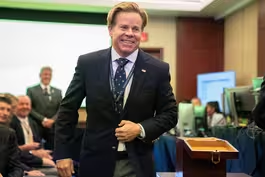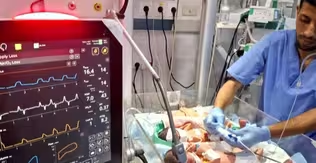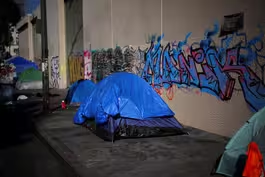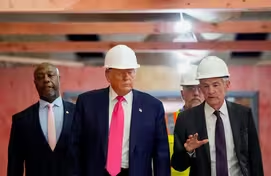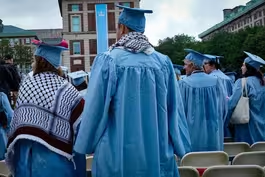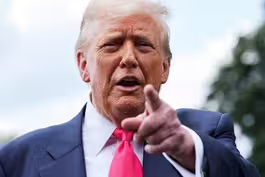
Crackdown on unpaid student loans could impact millions
Clip: 7/24/2025 | 8m 21sVideo has Closed Captions
How the government's crackdown on unpaid student loans could impact millions
The Trump administration is making significant changes to how it deals with student debt. It has resumed loan collections from past borrowers, and these changes could have a significant impact on weekly paychecks and credit ratings for many people. This month, two million overdue borrowers could be facing those penalties. Economics correspondent Paul Solman reports.
Problems playing video? | Closed Captioning Feedback
Problems playing video? | Closed Captioning Feedback
Major corporate funding for the PBS News Hour is provided by BDO, BNSF, Consumer Cellular, American Cruise Lines, and Raymond James. Funding for the PBS NewsHour Weekend is provided by...

Crackdown on unpaid student loans could impact millions
Clip: 7/24/2025 | 8m 21sVideo has Closed Captions
The Trump administration is making significant changes to how it deals with student debt. It has resumed loan collections from past borrowers, and these changes could have a significant impact on weekly paychecks and credit ratings for many people. This month, two million overdue borrowers could be facing those penalties. Economics correspondent Paul Solman reports.
Problems playing video? | Closed Captioning Feedback
How to Watch PBS News Hour
PBS News Hour is available to stream on pbs.org and the free PBS App, available on iPhone, Apple TV, Android TV, Android smartphones, Amazon Fire TV, Amazon Fire Tablet, Roku, Samsung Smart TV, and Vizio.
Providing Support for PBS.org
Learn Moreabout PBS online sponsorshipGEOFF BENNETT: The Trump administration is making significant changes to how it deals with student debt.
It's resumed loan collections from past borrowers, and those changes could have a major impact on paychecks and credit ratings for lots of people.
This month, two million overdue borrowers could be facing those penalties.
Economics correspondent Paul Solman has more.
SARAH BUNDY, Student Loan Borrower: About a year before the pandemic hit, they started garnishing my wages.
They were garnishing about 150 bucks from every paycheck.
PAUL SOLMAN: Sarah Bundy was in default on her student loans, but she was making just the minimum wage in New York state while working at a home for people with disabilities.
SARAH BUNDY: They garnished those payments for about a year, which brought me below minimum wage.
And then COVID hit, and the garnishment stopped.
PAUL SOLMAN: Garnishment, as in pulling loan payments out of a borrower's paycheck before she or he receives it.
As student loan collections resume this summer, Bundy expects garnishment to resume too.
SARAH BUNDY: When the garnishments start again, it's going to tip us over into the poverty line.
PAUL SOLMAN: OK, let's take a step back for a second.
How did we get here?
At the dawn of the pandemic, the Trump administration had paused all student loan repayment requirements to help provide economic relief.
JOE BIDEN, Former President of the United States: Student debt relief, and I'm honoring that commitment today.
PAUL SOLMAN: The incoming Biden administration kept in place the payment pause, while seeking to cancel some student loan debt altogether.
That was ultimately shut down by the Supreme Court.
So Biden then rolled out a program that enabled some borrowers to have their loans forgiven after a certain number of years.
And then the payment pause expired in the fall of 2023.
KAROLINE LEAVITT, White House Press Secretary: If you take out a loan, you have to pay it back.
It's very simple.
PAUL SOLMAN: Fast-forward to April of this year, when the Trump White House announced it would start collecting.
BETH AKERS, American Enterprise Institute: The Trump administration has made a decision to put back in place the previous system for loan collection, which includes wage garnishment.
PAUL SOLMAN: Beth Akers studies the economics of higher education at the conservative American Enterprise Institute.
BETH AKERS: Unfortunately, I think these loan collection mechanisms that feel unsavory are a necessary part of the system.
If borrowers have the resources to repay their loans, it's unfair for taxpayers if they don't make those loan payments.
And so sometimes the federal government needs to use these means in order to collect those dollars.
PAUL SOLMAN: Akers argues, as does the Trump administration, that the Biden administration was too soft on borrowers.
BETH AKERS: Ultimately, they use this sort of backdoor solution, which was to just make student loan repayment programs really exceedingly generous, so that, in effect, people don't pay back their loans, even though they weren't technically forgiven.
PAUL SOLMAN: Many borrowers we spoke with said they had been paying back their loans, but could only afford to cover the interest.
Not a one had made much, if any progress on the principle.
KELLY CASTILLO, Student Loan Borrower: I took out like $13,000 in loans, and I'm at $12,000 that I still owe, and I have been paying for about nine, 10 years now.
PAUL SOLMAN: Kelly Castillo is a teacher and mother of two in Fresno, California.
KELLY CASTILLO: I'm OK paying my money back, because I took it, I used it to pay for my tuition, but at the same time, I have been paying for many years, and it hasn't even gone down half.
PAUL SOLMAN: There's another problem borrowers have with the new payback push.
The official policy -- quote - - "is committed to keeping borrowers updated with clear information about their payment options to put them on a productive path toward repaying their federal student loans" -- unquote.
RICHELLE BROOKS, Student Loan Borrower: Those words sound like, we're coming after you and we're letting you know.
We're going to put it in big, bold writing that we're coming after you.
So I'm nervous about it.
I can't say that I think it's going to happen one way or another because I haven't been communicated with.
PAUL SOLMAN: Richelle Brooks is a high school principal in South Central L.A. She has six figures in student loan debt, her payments suspended temporarily during COVID.
The drastically cut-back Department of Education's guidelines, hard to follow or perhaps even comply with.
RICHELLE BROOKS: A lot of borrowers are falling through the cracks, where we don't know where we lie.
We don't know what the future is.
We don't have any answers.
PAUL SOLMAN: Like whether or not the undergraduate loan debt she took out to go to now-disgraced discredited Westwood College is actually forgiven, as she was told it would be.
RICHELLE BROOKS: I haven't received an updating years.
Well, I was pretty lost.
I was living on my own, not making good decisions.
And I met a recruiter and they said, hey, this is a school we can help you.
You will finish your degree quickly.
We will give you financial aid and we will give you a job.
And I said, OK, that sounds really good.
PAUL SOLMAN: Sounded really good, but wasn't for thousands of borrowers in similar situations.
RICHELLE BROOKS: Well, a lot of people that come from poor families, the recruiters from these private for-profit institutions find us and they know we're eager to get jobs, high-paying jobs, and it sounds good.
And we just don't have a knowledge base to know what a predatory institution looks like.
PAUL SOLMAN: As to the future, we heard the same lament time and again.
TIMOTHY RUNKLE, Student Loan Borrower: It's very confusing for what happens next.
PAUL SOLMAN: Timothy Runkle still owes $32,000, the principal on loans he took out more than 20 years ago.
TIMOTHY RUNKLE: I haven't received a letter or an e-mail from my loan servicer in over eight months or any information from the U.S. Ed Department about what will actually be done.
SUSAN DYNARSKI, Harvard Graduate School of Education: The main issue right now is running the existing system competently.
PAUL SOLMAN: Economist Susan Dynarski.
SUSAN DYNARSKI: At the beginning of the pandemic, the Trump administration suspended all student loan payments, which made sense at that time.
But that freeze kept getting extended by month, by month, year by year.
So think of how many addresses change over four years and banking details and all that information that you need to have up to date in order to make sure the payments go through properly.
To sort of immediately move to wage garnishment in the midst of this, I think is an unwise move.
PAUL SOLMAN: People should be paying back their debts, shouldn't they?
SUSAN DYNARSKI: I don't disagree that people should be repaying their loans.
I disagree with the way it's being done.
You don't deal with your frustration with people not repaying by grabbing their paychecks.
PAUL SOLMAN: What are the macro implications, that is, for the American economy as a whole, if garnishment becomes widespread and people are suddenly paying loans that they weren't paying for four years?
SUSAN DYNARSKI: That's money that's not available to pay for groceries and for rent and for buying cars and washing machines.
So it has a deflationary effect.
It causes the economy to contract.
Think of adding a 15 percent tax for five million people between now and September.
PAUL SOLMAN: At the borrower level, though: SARAH BUNDY: I don't know what they expect people to do.
I just want to tell my elected officials, like, here's my household budget.
You tell me what to do here.
I just don't see how we're going to be able to scrape it together.
I just don't.
PAUL SOLMAN: To which, says Beth Akers: BETH AKERS: If there were no repercussions for not paying, nobody would repay these loans.
And, unfortunately, student loans that are not repaid either by choice or because they're unaffordable for borrowers become a burden that ultimately gets shouldered by taxpayers.
PAUL SOLMAN: So, in the end, an age-old economic problem: Who pays for debts?
A little from everyone or a lot from those who took them on, but can least afford to pay them back?
For the "PBS News Hour," Paul Solman.
GOP Rep. Haridopolos recaps Trump's first 6 months
Video has Closed Captions
Clip: 7/24/2025 | 8m 23s | 'We kept our promises': Rep. Haridopolos touts GOP victories in Trump's first 6 months (8m 23s)
Inside Gaza’s neonatal wards where babies battle the odds
Video has Closed Captions
Clip: 7/24/2025 | 8m | Inside Gaza’s neonatal wards where babies born into a war zone battle the odds (8m)
News Wrap: Trump urges cities to clear homeless from streets
Video has Closed Captions
Clip: 7/24/2025 | 6m | News Wrap: Trump pushes cities to remove homeless people from streets (6m)
Trump ramps up pressure on Powell in Fed visit
Video has Closed Captions
Clip: 7/24/2025 | 8m 35s | Trump ramps up pressure on Powell to cut interest rates during visit to Federal Reserve (8m 35s)
What Columbia's settlement means for higher education
Video has Closed Captions
Clip: 7/24/2025 | 8m 12s | What Columbia's settlement with the Trump administration means for higher education (8m 12s)
Why the DOJ met with Epstein accomplice Ghislaine Maxwell
Video has Closed Captions
Clip: 7/24/2025 | 4m 41s | Why the DOJ met with Ghislaine Maxwell amid backlash over Trump's Epstein ties (4m 41s)
Providing Support for PBS.org
Learn Moreabout PBS online sponsorshipSupport for PBS provided by:
Major corporate funding for the PBS News Hour is provided by BDO, BNSF, Consumer Cellular, American Cruise Lines, and Raymond James. Funding for the PBS NewsHour Weekend is provided by...
